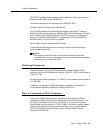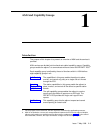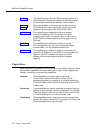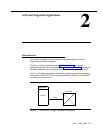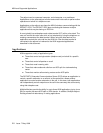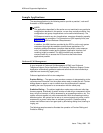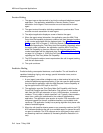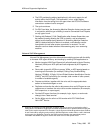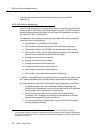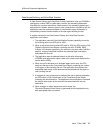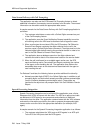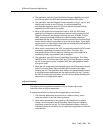
ASAI and Supported Applications
2-2 Issue 7 May 1998
The adjunct can be a personal computer, a minicomputer, or a mainframe.
Applications on the same adjunct monitor and control voice calls or perform other
operations on behalf of a telephone user.
Applications on the adjunct can share the ASAI link when communicating with the
DEFINITY ECS. The DEFINITY ECS does not distinguish between multiple
applications that may be sharing an ECS link.
A user typically has a telephone and a data terminal (PC) at his or her desk. The
user can control the voice calls at his or her telephone by using the telephone or
entering commands at the data terminal. When using the data terminal, the
application controls the voice call via the ASAI link. How the data terminal is
connected to the adjunct is irrelevant to the ASAI-supported applications
described in this document.
Applications
ASAI supports a variety of application types:
■ Those that control a single station (telephone set) on behalf of a specific
user
■ Those that control all parties on a call
■ Those that route incoming calls
■ Those that make outbound calls from an ACD split for a telemarketing
center
■ Those that monitor calls entering vectors and/or ACD splits
The DEFINITY Enterprise Communications Server (ECS) allows an application to
control a specific extension on a call and, at the same time, allows another
application to control another extension on the call. In this case, both applications
can independently control endpoints on the call in the same way that users can by
using their telephone set.
Multiple Monitors provide the ability for up to three ASAI applications (up to six on
R6r) to monitor the same ACD split or VDN domain. In addition, Multiple Adjunct
Routing allows link redundancy in routing applications.




